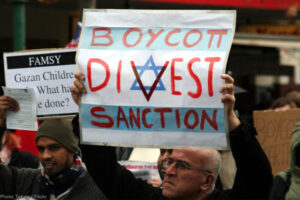By : Ali Farkhan Tsani, Editor of the MINA News Agency
The passage of time continues to pass, until today we enter the month of Rajab in the Hijriyyah Calendar. After the month of Rajab, then it will be continued with the month of Sha’ban and the month of Ramadan.
The holy month of Ramadan is only two months away, or about 60 days.
This article would like to remind all of us, to prepare ourselves to welcome Ramadan, since this month of Rajab, by trying to maintain and even improve various practices of worship, both individual and socially valuable virtues.
Also Read: Friday Sermon: Jews, Children of Israel, and People of the Book
The month of Rajab itself, like the month of Muharram, is included in the forbidden months. This is as Allah mentions in His verse:
إِنَّ عِدَّةَ الشُّهُورِ عِنْدَ اللَّهِ اثْنَا عَشَرَ شَهْرًا فِي كِتَابِ اللَّهِ يَوْمَ خَلَقَ السَّمَاوَاتِ وَالْأَرْضَ مِنْهَا أَرْبَعَةٌ حُرُمٌ ذَلِكَ الدِّينُ الْقَيِّمُ فَلَا تَظْلِمُوا فِيهِنَّ أَنْفُسَكُمْ
Meaning: “Indeed the number of months with Allah is twelve months, in Allah’s decree when He created the heavens and the earth, of which four are forbidden months. That is the straight religion, so do not persecute yourselves in the four months.” (Surah At-Taubah/9:36).
The four forbidden months referred to in the verse are the months of Rajab, Dzulqa’dah, Dzulhijjah and Muharram.
Also Read: Friday Sermon: Hijrah in the Struggle for the Liberation of Al-Aqsa and Palestine
It is said to be forbidden months because in these four months must be respected (hurum) and at that time it is not permissible (haram) to do war. This stipulation has been in effect since the shari’a of Prophet Ibrahim ‘Alaihis Salam and Prophet Ismail ‘Alaihis Salam, until the shari’a brought by the Prophet Muhammad sallallaahu ‘Alaihi Wasallam, including the prohibition of war was known and agreed upon by the people of ignorance, before the revelation of the Qur’an which was received by the Prophet Muhammad sallallaahu ‘Alaihi Wasallam.
Unless, of course, the Muslims are betrayed or attacked during the forbidden month, then in this case the Muslims are obliged to defend themselves and defend themselves from the evil of their enemies.
In the hadith it is stated:
الزَّمَانُ قَدِ اسْتَدَارَ كَهَيْئَتِهِ يَوْمَ خَلَقَ السَّمَوَاتِ وَالأَرْضَ ، السَّنَةُ اثْنَا عَشَرَ شَهْرًا ، مِنْهَا أَرْبَعَةٌ حُرُمٌ ، ثَلاَثَةٌ مُتَوَالِيَاتٌ ذُو الْقَعْدَةِ وَذُو الْحِجَّةِ وَالْمُحَرَّمُ ، وَرَجَبُ مُضَرَ الَّذِى بَيْنَ جُمَادَى وَشَعْبَانَ
Also Read: Sadaqah, A Simple Act with Extraordinary Virtues: Dr. Wahyudi KS
Meaning: “A year revolves as it has been since Allah created the heavens and the earth. One year has twelve months. Among them are four haram (holy) months. Three months in a row, namely Dzulqa’dah, Dzulhijjah and Muharram. (One more month is) Rajab which is located between Jumadil (End) and Sha’ban”. (Narrated by Bukhari, hadith number 3197 from Abu Bakr Radhiyallahu ‘Anhu).
Because of the glory of these months, including Rajab, the scholars really like to do sunnah fasting in it.
This is like the explanation of the companions of the prophet, Abdullah bin ‘Abbas Radhiyallahu ‘Anhu, who said, “Allah has designated these four months (Rajab, Dzulqa’dah, Dzulhijjah and Muharram) as haram months, considered as holy months, so committing immorality in that month is a sin, will be greater, and the good deeds that are done will reap more rewards.”
This glorification of the amaliyah of the month of Rajab does not mention prayer or fasting which is devoted to the month of Rajab. If you want to perform sunnah prayers, such as dhuha, tahajjud, qabliyah and ba’diyah that accompany fardhu prayers, the meaning is increased in this month of Rajab.
Also Read: The Dynamics of Living in a Muslim Community in the Modern Era
Likewise, if you want to carry out sunnah fasting, such as Mondays and Thursdays. The meaning is to enjoy the sunnah prayers and sunnah fasting in the forbidden months, including this month of Rajab.
Imam Al-Ghazali in the Book of Ihya ‘Ulumuddin explains that the sunnah of fasting becomes stronger if it is carried out on the main days (al-ayyam al-fadhilah). These main days can be found in every year, every month and every week.
Regarding this monthly cycle, Imam Al-Ghazali stated that Rajab is categorized as the main months (al-ashhur al-fadhilah) next to Dzulhijjah, Muharram and Sha’ban. The month of Rajab is also categorized as forbidden months (al-asyhur al-hurum) next to Dzulqa’dah, Dzulhijjah, Muharram.
Imam An-Nawawi in the Book of Syarah an-Nawawi ‘ala Sahih Muslim describes, it is true that there is not a single authentic hadith regarding Rajab fasting. However, it is clear and authentically narrated that the Prophet sallallaahu ‘alaihi wasallam liked to fast and increase worship in the forbidden month, and Rajab was one of the forbidden months.
Also Read: The Meaning of “Minal Aidin wal Faizin”
Al-Hafidz Al-‘Iraqi in al-Tabshirah wa al-Tadzkirah said, “As for the dha’if (weak) hadith that is not maudhu’ (false), the scholars have allowed it to be easier in the sanad and its transmission without explaining its weakness. As long as the hadith is not related to law and aqidah, but related to targhib (motivation) and tarhib (warning) such as advice, stories, and the virtues of charity (fadha’il al-a’mal)”.
Hopefully, we can increase worship in the month of Rajab, such as sunnah prayers and sunnah fasting in it, including other worship that has social or community value such as infaq, alms and helping others.
Moreover, increasing solidarity with the brothers who were colonized in Palestine, increasing productivity and quality of work in righteous deeds and optimizing jihad in the way of Allah.
At the same time, let us make this month of Rajab a month of preparation for the holy month of Ramadan. May Allah convey our age until the holy month of Ramadan. Amen. (T/RE1)
Also Read: The Atrocities of Zionist Israel During Ramadan
Mi’raj News Agency (MINA)




































 Mina Indonesia
Mina Indonesia Mina Arabic
Mina Arabic